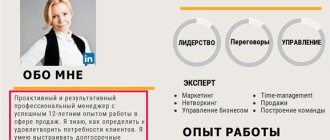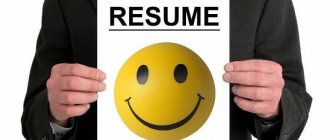How to present and “sell” yourself, what to say and what to remain silent about.
pixabay.com
The interview itself is not as scary as the question “What can you tell us about yourself?” On him. Since ancient times, it is he who has baffled even the most experienced, qualified and savvy job applicants. There is only one problem: you seem to be able to tell a lot, but everything is wrong, everything is wrong and the wrong words come to mind.
We don’t know whether any story about yourself at an interview can be cited as an ideal example, but we can definitely say that there are rules that should be followed during and before the interview so that the answer to the trickiest question is flawless.
We strongly advise against:
pixabay.com
1) Come to the meeting after the party
If this happens, and you abused it a lot the day before, then it’s better to reschedule the meeting.
2) Flirt
Almost 80% of recruiters are girls, different girls, so you may have a desire to combine business with pleasure, or you will think that the recruiter’s heart does not lie through the heart at all. Either way, this is a very, very bad idea. Because, most likely, you won't be the first to think so. Remember this.
3) Throw mud at your previous employer
About former employers, either well or not at all, this cannot establish the applicant as a decent person. There is nothing more to add.
4) Be nervous
No matter how cool the position is, no matter how much you want to get there, always remember that an interview is a meeting of two equal partners, and you also choose.
5) Start haggling
The first interview is not a reason to negotiate price prices, or start a conversation with the phrase “that’s all good, but what’s your salary.” It usually makes sense to have such conversations with the budget holder, usually this is the final meeting, and yes, nfv you can bargain!”
Why does an employer ask the question “What can you tell us about yourself?
pixabay.com
It may seem that the recruiter has nothing to do or that he lives a very boring life that he has already decided to take an interest in yours. This is not so, and this question is absolutely not random, even, one might say, calculated.
You are asked to tell us about yourself in order to:
A)
Find out how you can respond to a task (question, request) without preparation and without a pre-prepared response structure;
B)
They want to see and understand what you consider really important (after all, you will probably not tell your entire biography, but selected facts about your personality and work experience. But if your entire biography, then this is also a definite sign for an HR specialist and your future leader).
How a recruiter analyzes a story
Experienced personnel officers are usually experienced in practical psychology, regardless of the availability of appropriate education. Therefore, never lie. The applicant’s desire to deceive the interlocutor about something can be revealed by the “personnel specialist” based on the analysis of speech, gestures and facial expressions, during the process of completing a case, during clarifying, stressful and “leading” questions, etc. Of course, an artistic and insightful person who knows how to apply useful psychological techniques is able to calculate in advance the motives of the interviewer and develop the appropriate image and behavior to successfully pass the selection. But in most cases, the applicant should look into the immediate prospects after the competition: will this position and organization correspond to his own aspirations, style of work and relationships in the team, professional goals, will it provide stability and decent remuneration, will it satisfy ambitious personal and social needs? Typically, an employer, pursuing its serious goals, is, by definition, better informed about its own resources and capabilities to meet the employee’s needs. This means that if a person does not have specific difficulties related to facts of biography, health, financial and marital status, problems with the law, it is wiser not to use various psychological tricks, but to organize honest direct contact with the interviewer. In essence, the employer and employee pursue the same goals and are able to unite in achieving a common result if they are optimally suited to each other. Isn’t it better to turn the eternal “unarmed confrontation” between the recruiter and the applicant into cooperation? By constructing a story based on strong qualities and achievements, fixing the employer’s attention on professional skills and aspirations, you can achieve at least respect and interest and get into the personnel reserve.
Climb your career ladder: 5 elements of success
To try to look at yourself through the eyes of a recruiter, let's consider the main points of assessing applicants.
- Appearance. Many people know that it is customary to wear formal clothes for an interview. This indicator is taken into account by interviewers, although sometimes it disorients the interlocutor and greatly depersonalizes the candidate if the business type does not correspond to his character and inclinations. Small details and accents in the image speak more eloquently than words about neatness, sloppiness, scrupulousness, absent-mindedness and willingness to follow the rules. The choice of color can indicate character if the person has not specifically thought about this option. The preferred spectrum can be found in the psychological literature and on the Internet. The price segment of clothing, shoes, and accessories will also be informative.
- Demeanor and non-verbal reactions. When you freely talk about yourself, your “body language” becomes more expressive than during an outdated recruiter “interrogation.” Psychologists pay attention to the naturalness of posture, posture and behavior, extreme deviations (swaggering and “tightness”), involuntary reactions and gestures, a persistent facial “mask” and fleeting movements of the facial muscles. For example, if an applicant declares himself to be an optimist with an active life position, and the downturned corners of his mouth indicate the opposite, the observer will draw the appropriate conclusions. Impressive works on the interpretation of nonverbal (i.e., non-speech) information about a person are included in the training program for psychologists, investigators, personnel officers, etc. Anyone who decides to get acquainted with this vast field of knowledge will find a lot of interesting discoveries and curious facts, but it takes years of practice to assimilate and transform this amount of data into effective expected behavior. In addition, conscious suppression of the body’s natural reactions will sooner or later fail, providing the HR employee with some interesting food for thought. Here is a list of “body signals” that alarm HR officers:
- "running" look. It can indicate either the applicant's dishonesty or disinterest, or the person's shyness. A heavy gaze that never once moves to objects of furniture or figures of the interlocutor indicates a persistent aggressive character, a tendency to psychological suppression or lies. The most positive impression is made by an open look into the eyes, moving during a conversation over the partner’s face or over the details of the situation (while the person is remembering something or looking for the best formulation of a thought);
- the cross-legged pose and arms crossed on the chest can be considered signs of tension or excitement, lack of contact, and a desire to “disengage.” This “defensive position” can be replaced with a more open “hands in lock” gesture or touching fingertips. Extended legs, arms thrown on the back or armrests of the chair indicate either impudence or self-doubt. Both gestures indicate a subconscious “seizing of space.” To relieve this extra nervousness, you can prepare a folder in advance and place it on the manager’s lap or desk, moderately expanding your personal zone and giving yourself more peace of mind;
- some people have the habit of touching their face when thinking; however, the same movements can demonstrate deception and uncertainty. You can take a fountain pen, glasses to an interview, put on a discreet bracelet or ring - mechanically feeling these objects will fill the need for tactile sensations of the hands and at the same time distract from the face.
- Linguopsychological analysis. In other words, this is the reconstruction of a personality portrait based on speech data. This type of work with initial information is accessible even to a novice interviewer and is included in the mandatory training program for HR specialists. By compiling a training story about yourself on the eve of the interview and viewing it for speech “beacons”, you can predict the judgment of a personnel specialist and, if necessary, adjust your self-presentation in advance. It should be remembered that artificial cleaning of the text is not able to correct the personality traits that may appear during additional questions and in further conversation with the personnel employee. What indicators do psychologists consider as part of linguistic analysis?
- activity (many pronouns “I”, word forms “want”, “did”, “confident”, “intend”, “insisted”, “offered”; perfect forms of verbs) – passivity (“would like”, “did”, imperfect forms of verbs, impersonal “will be done”, “I have studied” and passive constructions (“I was introduced”, “I was told”; figures of speech “most likely”, “seems”, “almost”, “simply”, “practically”, “sort of”, “I hope”) Activity is often considered a preferable trait, it means responsibility, the ability to make decisions, autonomy (the “loner” type), but in many professions it is uncritical, is not an analogue of hard work and can even reduce efficiency during monotonous detailed work Plural verbs “do”, “did” indicate a commitment to teamwork; verbal nouns “actions”, “study”, “education”, “enterprise” - indicate an analytical mindset, the ability to think about one’s actions and reduced activity. “Activists” are effective in sales, people who combine “active” and analytical forms are ideal for middle and senior managers, analysis; passive people are manageable and efficient;
- orientation towards results and capabilities or process and procedures (technologies) is analyzed based on the content rather than the form of speech. The text highlights equal or different proportions of details regarding processes and goals. For example, a result person focuses on actual achievements, while a process person talks about what attracts him to work. The ideal employee knows how to combine both programs of action even with a strong predominance of one of the poles. The tendency towards one or another type of activity is also revealed by the relationship between verbs of the perfect and imperfect form (“do” - “to do”);
- the “similarity-difference” pair states, respectively, a person’s tendency to compromise and stability or conflict, ingenuity and search for solutions. The indicator is determined by the predominance or balance of the search for differences or common features, as well as word forms indicating a particular tendency. Similarity: “much in common”, “coincides”, “both there and here”, “similar”, “similar”, conjunctions “and”, “a”. Difference: “however”, “different”, “much more/less”, “but”. As with the previous factor, candidates who combine both capabilities are most important to employers. The tandem of similarity and process is impeccable for routine duties where pedantry and strict adherence to regulations are required - conveyor work, accounting in some areas, office work, operator; the combination of distinction and process is characteristic of successful controllers, auditors and inspectors; the radical pair “difference and result” is required in inventive, exclusively creative work; combining similarity and result is ideal for almost any activity. When looking for a job and other fluctuations in life stability, the desire to identify differences increases by 10–30% of the usual norm for almost everyone;
- the characteristic “aspiration” is similar in meaning (type “as it should”: words with a positive emotional connotation, for example, “contact” or “accommodating”” instead of “non-conflict”, “interesting” should be replaced with “non-routine”, “close”, and not “not far”, “with a normalized schedule” is better than “without overtime”, “with good pay”, without using “without delays in payments” or “normally paid”) - “avoidance” (type “how not to”: words with the particle “not”, for example, “non-conflict”, negative and intermediate formulations “suitable”, “acceptable”);
- globality (short general phrases) - detail (many details) in speech shows, accordingly, whether a person is inclined to global thinking, the ability to think in large categories, calculate results, see prospects and distant relationships. Or his “strong point” is punctual activity with the need to take into account and notice many details. For example, an absolute “globalist”, in response to a request to indicate the source of the vacancy, will say: “I got a call from the agency”; a complete “detailer” will break it down into points: “Last month I sent my resume to the recruiting agency “...”, and they recently called me, although I had already, in principle, found a place, but I still decided to come to you for an interview, because that I like your company more because...” Detailed-minded people are needed in professions that require scrupulousness and accuracy (accountant, lawyer, controller, draftsman, etc.), “globalists” can be project managers, development directors, analysts, etc.;
- internal or external type of reference is an orientation towards one’s own or someone else’s opinion, experience, desires and interests, which can also manifest itself in a mixed form. Internal reference is important for “staff” analysts (lawyers, financiers, etc.), supervisory positions, and also, in a milder form, for all management positions. The external type reveals a perfect performer, an insecure immature personality and is often found among young people at the beginning of their working life. Specialties associated with active communication (sales and customer service manager, mid-level accountant, financial consultant, project manager, logistician) require an equal balance of types. Signs of internal reference: “I myself”, “I saw”, “I like”, “I feel”, “It seems to me”, “I am sure”, “I did”. External reference: references to an objective result, generally accepted norms, someone else’s opinion, praise, recommendation, phrases “I was appreciated”, “so he thinks...”;
- the “content – environment” pair shows an orientation toward the essence of the work, a predisposition to act with data, numbers, technology, documents, or the human factor, communication. People who are closer to the first pole on this scale, when narrating about themselves, focus on the content of the work, while their “opponents” devote a significant part of the story to the team, clients, students, patients, subordinates, etc.
Politely and tactfully refuse a vacancy
What should the answer be?
How to correctly build a story about yourself and “sell” yourself at an interview?
Who you are?
Video by Valeryi Vildanov, youtube.com
Your first sentence should be an introduction to who you are professionally, an overview, so to speak, a statement that demonstrates your strengths and gives at least a little insight into your personality. This is not easy to do gracefully without preparation. So rehearse in advance.
Fine:
«
I am an innovative HR Manager with 8 years of experience managing all aspects of HR - from recruiting to training - for Fortune 500 companies...
».
Badly
: «
Well, I grew up in Moscow. As a child, I actually wanted to become a firefighter, but then I became interested in dinosaurs. I excelled in science early on, winning first place in my science fair in fourth grade. Funny story about this...
»
Too much
a lot of unnecessary information. Where is the point?
Basic Skills
pixabay.com
Don't assume that the interviewer has carefully read your resume and remembers all your details and qualifications by heart. Highlight 2-4 main points that you think make you stand out.
Fine
: «
I have spent the last six years developing my skills as a Customer Service Manager at So and So Company, where I have received several performance awards and double promotions. I love managing teams and solving customer problems...
».
The emphasis here is on experience, passion and evidence of effectiveness.
pixabay.com
Badly
: «
My first job was as an administrative assistant in a shopping center in a prestigious area of Moscow. I learned a lot there and that knowledge served me well over the next 12 years. At that time, I was unsure of my career, so I started selling real estate. It only lasted six months, but I certainly enjoyed it as much as I could...
».
And everyone fell asleep. Nobody cares about your first job 12 years ago. You're starting with the least impressive part of your career, and the interviewer will likely just tune out before you get to the meat of your biography.
Why are you here?
You need to finish with a story about the desired position and the reasons why you are the ideal candidate.
pixabay.com
Fine
: «
Although I enjoy my current job, I feel that I am now ready for more challenging tasks, and this position really appeals to me in that sense...
».
Positive, honest, concise.
Badly
: «
Due to the financial problems of the company and the problems of my boss, I am worried about the stability of my job, which is why I decided to start looking for new opportunities...
».
Don't be too open or you risk backlash. This answer also makes it seem like you're interested in any job at all, not this one in particular.
Story About myself
My name is Belova Angelika. Adults call me Angela, my parents call me Anji. I prefer simple and concise: Lika. Only my friends call me that.
Usually everyone who knows my name says that I live up to it. Perhaps this is true. Unlike my parents, nature gave me a heart-shaped face and large round eyes. And guess what color they are? Violet. My eyes are not bright, but they are clear and unusual for most people. Many people, when they first see me, ask if I wear contacts. Every time I have to shake my head knowing that no one will believe me.
Although, I have something that I got from my parents. Straight hair, the color of ripened rye from my mother. And a snub nose from dad. Perhaps these are the only facial features similar to them.
Even my figure is different from them. My mother has always been a thin girl with narrow shoulders. Dad was also never overweight; he was slim, but nothing more. I inherited a wide bone from someone. I wasn't curvy or fat. Just stocky. But this didn’t help me much in choosing clothes. Even my wrist was twice the size of my mother’s. Although in general I had a good figure: moderately toned, but not too inflated. Although the fact that I do athletics played more of a role here than the genetic factor.
Angelica means angel. Friends have told me that my golden hair and violet eyes fit this description perfectly. And my height was appropriate: I was a little over one and a half meters. There remains only one thing that can be considered angelic with little doubt: character. Yes, I was kind, friendly and cheerful. But at the same time, I was persistent, purposeful and sometimes a little selfish. Although I tried my best to eradicate the latter quality. At the same time, I always helped those who needed my help. So, most likely, my name really suits me. Be that as it may, I loved myself and the people close to me. And I knew that they loved me just the same.
How should you present yourself during an interview?
pixabay.com
Paraphrasing your resume
Many candidates respond by simply reading their resume from beginning to end. This can turn into a very long monologue that starts with the oldest and probably least important and impressive. By the time you get to the good stuff, your interviewer will have fallen asleep and already cast someone else for your role.
It is important to prepare a summary of the main points of each of your past positions. It is likely that you will be asked about your achievements and day-to-day responsibilities in previous positions. Ideally this should sound like this. like an exciting conversation, and not like a long monologue from the first seconds.
And yes: you don’t need to talk all the time about the fact that you have a diploma. Once is enough.
Mr and Mrs Modesty
pixabay.com
Many job seekers make the mistake of showing their modesty when interviewed. They start with a modest or vague introduction that lacks a clear message of their strongest qualities.
They are afraid to characterize themselves as unique employees who are not just needed by this company, but necessary - and this is very bad.
Some of these people are just shy people who don't feel comfortable "selling" themselves. Others simply never had to worry about how to present themselves - new opportunities were always chasing them, and the job market was not so competitive.
First date feeling
pixabay.com
No, this is not the first date. Your interviewer doesn't want to hear that you like Mojitos and hanging out in the rain. Many college graduates misinterpret this question and talk too much about their personal lives and hobbies.
You need to describe yourself wisely: in these types of interviews, it is much more interesting to know who you are as a person. In interviews, focus on who you are as a professional unless you are asked about hobbies or activities outside the home.
- Author: Marina Tikhomirova
What should you say about yourself during an interview?
Firstly , your answer to the employer’s question “Tell me about yourself” should be thoughtful. The employer does not need information that you worked as an operator 5 years ago if you are currently applying for the position of HR manager.
Secondly , your answer should be clear, specific and concise (try to keep it within 2 minutes). The basis of the story about yourself should be your skills and professional achievements. Give a little background, then use specific examples to list a few of your key accomplishments and skills, and finish with information about your goals and interests.
And lastly , your answer should be structured. That is, it is built according to one of the formulas discussed in the previous subsection of the article (for example, it is built according to the win-win formula past-present-future).






